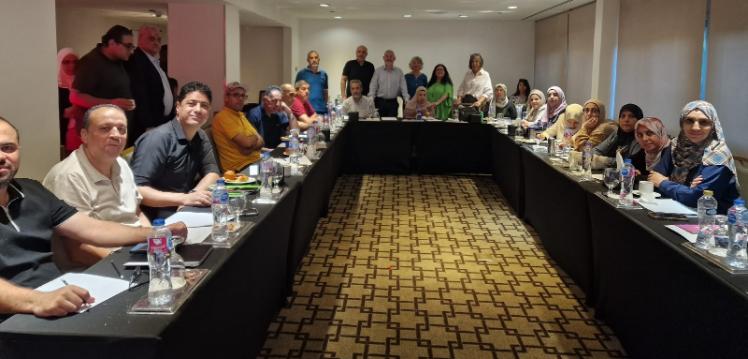
Building Bridges in Education: Queen’s University Belfast’s Support for Palestinian Educators in Cairo
Recent efforts by Queen’s University Belfast highlight the institution’s ongoing commitment to fostering educational development in conflict-affected regions. This initiative, centered around support for Palestinian educators, exemplifies how universities in the UK can play a pivotal role in conflict resolution and educational rebuilding efforts. Particularly, the visit to Cairo by a delegation from Queen’s underscores the importance of international collaboration in cultivating sustainable and trauma-informed educational systems.
Palestinian education faces numerous challenges, especially amid ongoing conflict and restrictions that hinder educational access and quality. Recognizing these hurdles, Queen’s University Belfast has positioned itself as a supporter of conflict-resolution through education, leveraging its expertise in conflict-affected and divided societies. The recent delegation to Cairo was designed to engage with Palestinian educators from Gaza, exchanging knowledge on trauma-informed pedagogy, curriculum development, and strategies for rebuilding educational infrastructure.
Queen’s University Belfast’s Dedication to Conflict Resolution through Education
Queen’s University Belfast has long been recognized for its research and policy work in promoting social cohesion, integration, and shared education. Its experience in transforming post-conflict societies, particularly Northern Ireland, informs its approach to supporting Palestine. The university emphasizes trauma-informed teaching methods, which recognize the psychological impact of conflict on students, aiming to create safe, inclusive learning environments that facilitate resilience and learning outcomes.
While the initial plan was to host Palestinian educators at Queen’s campus for a capacity-building program, visa complications necessitated a shift to Cairo. Despite this logistical hurdle, the institution’s commitment remains unchanged: to share expertise, strengthen educational partnerships, and contribute to the strategic rebuilding of Palestine’s education system.
Educating for Reconciliation: Lessons from Northern Ireland
The experience of Queen’s in Northern Ireland offers valuable insights into managing education in divided societies. Its curriculum reforms, community engagement, and policies aimed at fostering social cohesion serve as models for Palestine. Topics such as shared education and community-based initiatives are pivotal to creating environments where different groups can learn and grow together, fostering mutual understanding and reconciliation.
Participants in the Cairo program explored how these approaches can be adapted to the Palestinian context, emphasizing the importance of understanding trauma’s effects on behavior and learning. The collaboration aims to develop frameworks that support teachers and students alike in overcoming the psychological scars of conflict.
Role of Higher Education in Rebuilding Conflict-Affected Societies
The involvement of universities like Queen’s in peacebuilding initiatives underscores their vital role beyond traditional education. Higher education institutions are repositories of knowledge, research, and policy expertise necessary to inform effective conflict resolution strategies. Their involvement in international partnerships can help nurture dialogue, promote understanding, and facilitate the development of resilient educational frameworks.
Queen’s partnership with Forward Thinking charity and St Mary’s University College exemplifies a multidisciplinary approach, combining academic excellence with community outreach and policy advocacy. These collaborations aim to prepare educators and policymakers to face the complex realities of education amid conflict and to develop sustainable solutions rooted in local context.
Future Directions and Opportunities for Educational Support in Palestine
Looking ahead, efforts to rebuild and sustain Palestinian education will require continuous international engagement and tailored support. Queen’s University Belfast plans to revisit on-campus programs later in the year, contingent upon visa regulations, demonstrating its commitment to ongoing support. Moreover, initiatives like the Copty Scholarship exemplify tangible support for Palestinian students and capacity building within the region.
In addition to direct support, fostering networks among educators, policymakers, and international organizations is crucial. These collaborations can facilitate knowledge exchange, share best practices, and develop innovative educational policies suitable for conflict and post-conflict societies.
How Universities Can Contribute to Conflict Resolution
Universities worldwide can adopt several strategies to support conflict-affected regions:
- Implement trauma-sensitive curricula and teaching practices to support student well-being.
- Establish partnerships with local communities and international organizations to share expertise and resources.
- Develop scholarship programs aimed at empowering students from conflict zones.
- Engage in research that informs policy and promotes social cohesion.
- Offer training for teachers and education administrators tailored to conflict-sensitive education contexts.
Encouraging Action: Join or Support International Educational Initiatives
For educators, students, and policy advocates interested in making an impact, engaging with programs and partnerships like those led by Queen’s University Belfast offers a meaningful pathway. Supporting international collaborations focused on trauma-informed education and conflict resolution can foster global solidarity and long-term peacebuilding efforts.
Whether through academic research, participation in exchange programs, or advocacy, individuals can contribute to strengthening education in conflict zones. As Queen’s example demonstrates, dedicated and strategic efforts by higher education institutions are vital to nurturing hope and rebuilding futures in regions impacted by prolonged conflict.
Conclusion
Queen’s University Belfast’s recent visit to Cairo embodies a proactive approach to conflict resolution through education. By sharing expertise, fostering international partnerships, and advocating for trauma-informed pedagogies, the university underscores the transformative power of education in conflict-affected societies. Support for Palestinian educators not only aids immediate rebuilding efforts but also lays the foundation for resilient, inclusive, and peaceful educational systems that can withstand future challenges.
To learn more about how universities are supporting conflict resolution worldwide, explore related initiatives and consider how you can contribute to global educational efforts. Together, education can be a tool for peace, understanding, and long-term societal healing.

